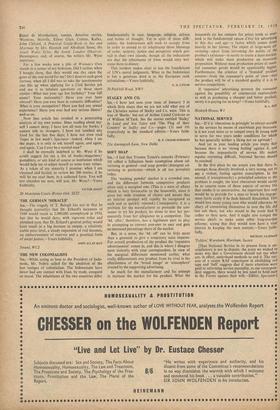NATIONAL SERVICE
SIR,—If it is 'obnoxious in principle' to attract recruits to the services by means of exorbitant pay increases, is it not even more so to compel every fit young man to serve for two years under conditions for which he has generally neither a liking nor an aptitude?
And yet in your leading article you imply that because there is no 'strong feeling' against it, and because the unpopularity of service life makes regular recruiting difficult, National Service should be retained.
In the first place let me assure you that there is, amongst those directly involved, a very strong, not to say a violent, feeling against conscription. In the second, if (exceptionally) a principled solution to the problem is sought, the least obnoxious would surely be to remove some of those aspects of service life that render it so unattractive. An important first step would be to provide for a man to break his engage- ment fairly easily if he finds himself dissatisfied. This would lure many young men who would otherwise be chary of committing themselves in case the life did not suit them, but who would in the event find it rather to their taste. And it might also compel the service chiefs to make some other long-overdue reforms; seeing that they would now. have a vital interest in keeping the men content.—Yours faith- fully,
MICHAEL LEAPMAN 'Tylden,' Warnhatn, Horsham, Sussex
[That National Service in its present form is un- satisfactory is not in dispute; the point we wished to make was that a Government should not use what are, in effect, underhand methods to end it. The suc- cess of a recent RAF experiment in abolishing red tape and 'bull' suggests that if more attention were paid to reforming service mentality, as our correspon- dent suggests, there would be less need to hold men in the Forces against their will.—Editor, Spectator.]


































 Previous page
Previous page